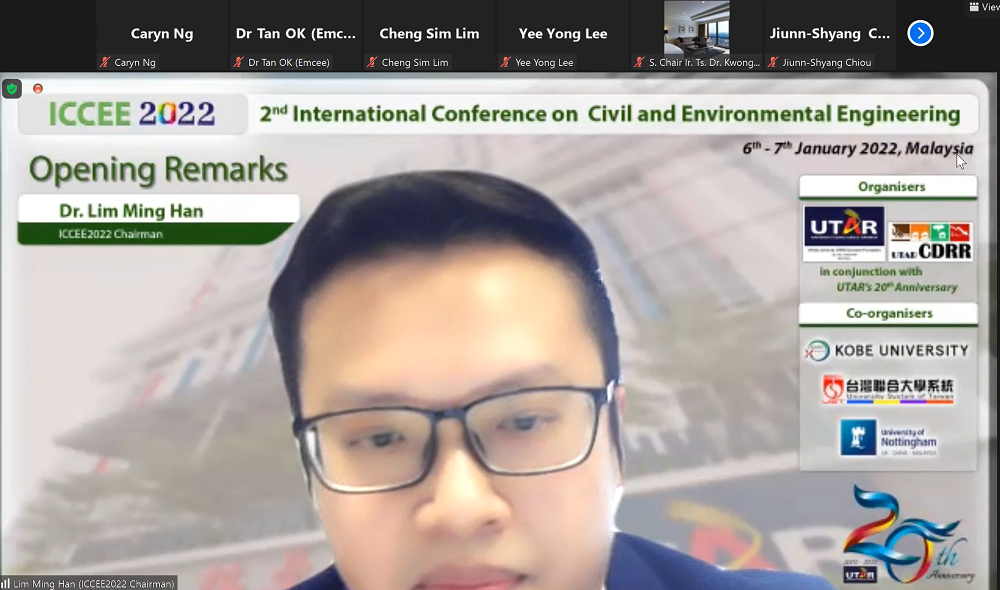
![]()
.png)
.png)
Group photography session
UTAR Centre for Disaster Risk
Reduction (CDRR), together with co-organisers University System of Taiwan,
Kobe University and the University of Nottingham Malaysia, hosted a virtual
conference titled “2nd International Conference on Civil and Environmental
Engineering (ICCEE2022)” from 6 to 7 January 2022 with the aim to provide
opportunities for the delegates to exchange ideas and research experiences
and to establish research collaborations with global partners.
The conference attracted researchers,
scholars, engineers, technologists, and students from universities and
industries throughout the world, involved in Civil and Environmental
Engineering. More than 90 research papers were presented. Nearly half of
them were submitted by international participants from Taiwan, Japan,
Vietnam, Thailand, United Arab Emirates, Indonesia, Egypt, Ireland, Saudi
Arabia, Italy, India, Ukraine, Philippines, Australia, Algeria, Bulgaria,
Kuwait, Pakistan, Poland, South Africa, Oman and Portugal.
.png)
Prof Ewe delivering his speech
At the opening ceremony, Prof Ewe
said, “Unlike our first conference, this conference is a virtual conference.
Despite that, we received an overwhelming response from researchers all over
the world to showcase their work and contributions in the fields of civil
and environmental engineering. We always believe in community engagement and
in facilitating enriching activities not only for our students but also for
the community. With the current pandemic and other challenges faced by the
world today, civil and environmental engineering is expected to play an
important role in the recovery of our economy as well as in building the
resilience of our society to face unexpected challenges in the future.”
He added, “This conference is
organised to bring together academics and researchers to share their
experiences, ideas and approaches related to contemporary issues in civil
and environmental engineering that affect our communities as well as to
showcase new and innovative technologies to build a more resilient and
sustainable society. I hope that the diversity of local and international
participants will bring in fresh perspectives and ideas for a more enriching
conference experience for all participants.”

Dr Lim welcoming the participants
ICCEE 2022 Chairman Dr Lim Ming Han
welcomed the participants and said, “The diversity in research areas is
beneficial for participants in seeking new knowledge and looking for
potential research collaboration with researchers from all around the world.
We would like to express our deepest gratitude to the keynote speakers for
sharing their experiences and research with us today. Thanks to the
organising committee for their support and dedication throughout the process
of holding this conference. I also hope the participants will enjoy the
conference.”
UTAR Adjunct Prof Emeritus Dr Yasuo
Tanaka presented the first keynote address titled “2030 Issues and
Evolutions Needed in Civil Engineering” whereby he spoke about issues that
would be posed by global warming in the year 2030 and how civil engineers
can help and rectify the current course of global society towards a
sustainable and harmonious future.
The second keynote address “Structure
Health Inspection, Monitoring and Diagnosis of Bridges in Taiwan” was
presented by National Central University, Taiwan Prof
Dr Wang Chung-Yue. In his address he spoke about structural health
monitoring (SHM) systems that have been built for severely degraded or
important life-sustaining system bridges, using strain gauges,
inclinometers, accelerometers, thermometers, gyroscopes, wind anemometers,
displacement meters, subsidence meters, bridge weigh-in-motion, etc. to
grasp the influence of external loads and environmental factors on the
behaviour and function of the bridge. These monitoring data will be combined
with engineering mechanics and various statistical analysis, deep learning,
artificial intelligence and other methods to perform structural safety,
function and service diagnosis.
In the third keynote session, Kobe
University, Japan Prof Dr Yusuke Uchiyama presented on “A Post-disaster
Assessment on a Storm-induced Flood and Associated Coastal Dispersal of the
River-derived Suspended Radiocesium Originated from the Fukushima Nuclear
Accident”. He spoke about two-month numerical hindcast including the storm
and flood event associated with Typhoon 201326 (Wipha) passed off the
Fukushima Coast in October 2013 using a coupled river-ocean-wave-sediment
model along with a static absorption model to account for radiocesium
attached to sediments. In the research, they carried out a quantitative
assessment of the accumulation and erosion of the sediments and resultant
suspended radiocesium distribution around the river mouth and nearshore
areas along the Fukushima Coast.
Concordia University, Canada Prof Dr
Chen Po-Han presented the fourth keynote session with his speech titled
“Improving Architectural Design Comprehension Effectiveness through the Use
of Mixed Reality”. In the research, they assessed the effectiveness of
design review through Mixed Reality (MR) using the “Microsoft HoloLens”
versus traditional 2D methods such as printed plans, renderings elevations
and sections.
“Perspectives on Multi-facet Impacts
of Global Warming to the Hydrosphere & Cryosphere” was presented by
University of Alberta, Canada Prof Dr Gan Thian Yew during the fifth keynote
session. In the session, Prof Gan shared about the global energy balance,
greenhouse effects and examples of observed changes to the hydrosphere. He
also discussed the possible implications to the future global climate,
hydrology, and water resources under the potential impacts of climate change
as well as the possible implications to the future global cryosphere under
the potential impact of climate change.
A total of 94 papers were presented
from five tracks, namely Infrastructure and Building Construction,
Construction Materials and Technologies, Earthquake and Geotechnical
Engineering, Water and Environmental Engineering and Disaster and
Construction Management.
.png)
.png)
.png)
.png)
.png)
Top to bottom: Prof Emeritus Dr Yasuo
Tanaka, Prof Dr Wang Chung-Yue, Prof Dr Yusuke Uchiyama, Prof Dr Chen Po-Han
and Prof Dr Gan Thian during their presentations
Wholly owned by UTAR Education Foundation (200201010564(578227-M)) LEGAL STATEMENT TERM OF USAGE PRIVACY NOTICE